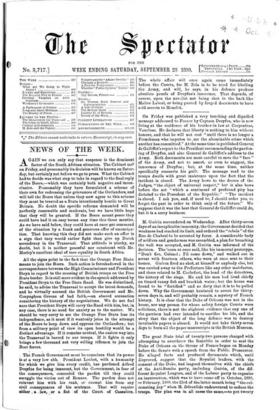M. Gui5rin surrendered on Wednesday. After thirty-seven days of an
inexplicable immunity, the Government decided that weakness had reached its limit, and ordered the " rebels " of the Rue de Chabrol to be arrested by force. A considerable body of soldiers and gendarmes was assembled, a plan for breaching the wall was accepted, and M. Guerin was informed of the decision. The 'coon at once said, like his immortal prototype, "Don't fire, Colonel ; I'll come down," and walked out in arrest with fourteen others, who were at once sent to their homes. Guerin fired no shot, at himself or anybody else, but was carried away to the Prefecture like any other malefactor, and there related to M. Cochefert, the head of the detectives, the history of the siege. He and his men had lived chiefly on tinned tunny fish and brackish water ; but the house was found to be " fortified " and so dirty that it is to be pulled down. Why the Government hesitated to arrest for thirty- seven days is, and will probably remain, a mystery of French history. It is clear that the Duke of Orleans was not in the house, nor any person for whose safety foreign Courts were solicitous, there is not the slightest evidence that any one of the garrison had ever intended to sacrifice his life, and the story that the object of the long defence was to destroy invaluable papers is absurd. It would not take thirty-seven days tc burn all the paper manuscripts in the British Museum.


































